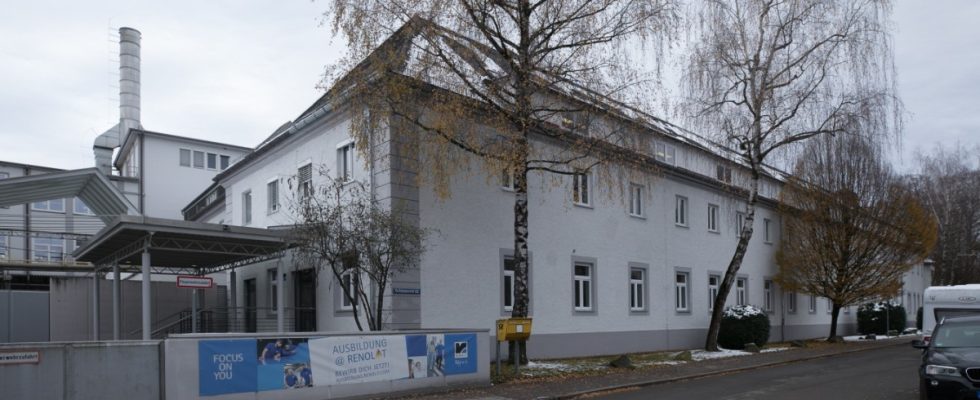Depending on the wind direction, the plastic smells that sometimes waft through Solln can intensify quite a bit. The unpleasant scent wafts from the Munich branch of the chemical company Renolit, which has been producing films on Morgensternstrasse in Solln for decades, primarily for the furniture industry. For many residents, olfactory nuisance is already part of the DNA of their district.
The citizens’ initiative (BI) “Breathing plastic-free” no longer wants to accept this. And she asks about the composition of the exhaust gases and fears harmful substances such as plasticizers (phthalates). A technical defect in a silo at the Renolit factory may also play a role in raising awareness, as a result of which around 50 kilograms of PVC were thrown into the air on Morgensternstrasse two years ago and fell as white powder in the neighborhood. It was said at the time that it was harmless to health.
After inspections, the city’s Department for Climate and Environmental Protection (RKU) has so far confirmed that the company is generally harmless. And the company especially rejects any assumptions that it could pose a health risk. But according to research by BI spokespersons Alexander Eberle and Stefan Brenske, the controls do not extend to the entire production facilities. They also consider these to be outdated. In any case, higher standards are common among suppliers to the automotive industry. No wonder that the Solln factory lacks certification according to the European environmental standard EMAS, they say.
“Breathe without plastic” is a young initiative in the south of Munich, but is already developing a lively correspondence with authorities, politicians, professional associations and chemical experts. There have been successful applications at a citizens’ meeting, appearances in the district committee, and even a factory tour has already been completed. However, Eberle and Brenske complain that the result of these efforts is unsatisfactory.
Alexander Eberle recently commissioned an investigation on his own to find out whether traces of plasticizers could be found in the schoolyard of the Herterichschule in Solln. The concentration determined did not break any limits, but was still “worrying,” Eberle wrote to Stefan Forster, the head of the Sollner Renolit plant, about the results of the analysis. And the trail clearly leads to Morgensternstrasse because there is no other manufacturer of plastic products far and wide. In return, Forster responded with a “request to make the discussion more objective.” At Renolit, plasticizers are “retained by the filters with a very high separation rate,” he assures.
The city administration currently has no complaints
Another point that urgently needs to be discussed, according to the citizens’ initiative, is the suspected lack of certain measurements in PVC production at Renolit. Unfortunately, these are not mandatory because the quantity produced remains below 10,000 tons – a limit for initiating such controls.
When asked, the city’s environmental protection department said there had been “currently no complaints at Renolit within the scope of the legally required monitoring.” At the same time, the department confirms the citizens’ initiative’s assumption that the Solln branch of Renolit SE (headquarters in Worms) also has systems in operation that “do not require approval”, which in turn limits the “opportunities for intervention”. Nevertheless, the authority takes the public’s concerns seriously and is currently investigating them. The systems that do not require approval will now also be “inspected as part of regular monitoring.”
Regarding the production of PVC films and the plasticizers used, the department explains that possible dust emissions from granules are cleaned in electrostatic precipitators before being discharged into the open air. There are therefore “no local effects” from the use of phthalates. The authority does not doubt that plasticizers can generally end up in the environment and even in food. However, the intake levels are usually so low that “there is no health risk.”
Inspections take place in the printing plant every three years
A foil printing shop and a combustion system are approved for operation on Morgensternstrasse under immission control law. Inspections take place in the printing plant every three years, the last one so far in 2022. Measurements in the regenerative afterburning systems used to purify the air were last carried out in February of this year, the department said.
The Renolit company emphasizes in a statement that it has modern production facilities for plastic processing and meets all legal requirements. The Solln plant produces plastics made from polyolefins (PO), polyester (PET) and polyvinyl chloride (PVC). In fact, the total production of all plastic films combined exceeds 10,000 tons per year, but the production of the PVC films that the citizens’ initiative is concerned with is “significantly lower”. Renolit therefore falls below the limit value of the Federal Immission Control Ordinance.
Regarding the measurement data from the analysis that the citizens’ initiative itself commissioned, a spokeswoman for the company states that her company has three values in this regard. These substances found in the dust are “not used” in the Solln plant. All raw materials used for film production comply with the requirements of the European chemicals regulation REACH. Furthermore, a comprehensive risk assessment was carried out – with the result that “our raw materials are considered safe for people and the environment when used as intended.”

